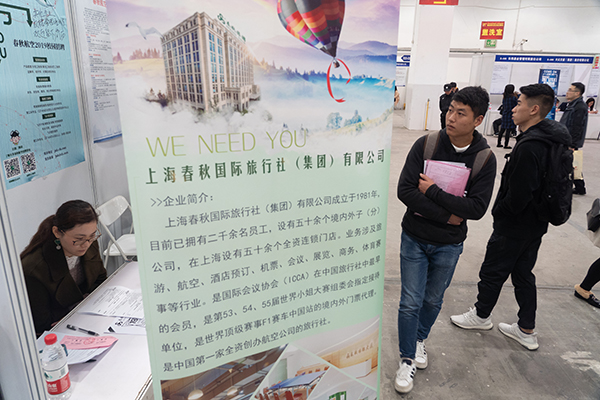A cluster awash with opportunities
By Zhou Wenting | China Daily | Updated: 2019-01-11 08:05

During the China International Import Expo in Shanghai on Nov 5, President Xi Jinping listed the integrated development of this region as a key national strategy, which also highlights the important role of Shanghai in the nation's opening-up initiatives.
Most positions offered at the job fair were in key industries related to the region's long-term plans, such as modern manufacturing, biotechnology, computer software, foreign-trade logistics, scientific research and education.
Li says that human-resource authorities in the delta had signed a framework agreement on talent matters in March. It includes efforts to promote the flow of talent within the region.
"We're also planning to hold such job fairs in other provinces in the delta," he said.
A human-resources manager surnamed Zhang with Zheshang Insurance in Hangzhou, Zhejiang, says she has also noticed a change in job-application patterns.
"In the past, nearly all the university graduates, regardless of whether they are Shanghai natives, only wanted to work in the municipality. Now, some are willing to venture outside the city in search of opportunities," says Zhang, who attended the job fair to hunt for new employees.
"I believe one of the reasons behind this new trend is the integrated development of the Yangtze River Delta, which has been upgraded over the years and mentioned a lot last year. The region now offers the young generation good career prospects in a big, interconnected market."
Wang Yun, deputy director of the Hefei City Public Employment and Human Resources Service and Management Center, says: "Previously, only Anhui natives showed interest in our local enterprises, but now we are receiving an increasing number of resumes from applicants residing in other parts of the delta."
But not everyone is keen to leave their hometown in search of jobs. Lu Siwei, who majors in marketing at the Shanghai Ocean University, only applied for roles in such enterprises as airlines and foreign banks that are based in his home city of Shanghai.
The 22-year-old and her mother agree Shanghai is still the place with the best opportunities for personal development.
Xiao Fei, a recruitment manager at Spring Airlines, says that Shanghai is still the top choice for most graduates in the delta, regardless of whether they are based in the city.
"Many people still believe Shanghai is a superior location because it is an international hub that offers relatively higher salaries," he says.
Job-hopping millennials
Another reason behind the growing trend of working in other cities is the younger generation's penchant for job-hopping.
According to a survey by the professional-networking site Linked-In, younger people are doing so more often than their predecessors.
The LinkedIn report published in November found that those born between 1990 and 1994 move to another city to start a new job once every 18 months. Those born after 1995 do so once every 10 months.
In contrast, those born in the 1970s and 1980s do so every three and 2.5 years, respectively.
Chen Mei, senior manager of content marketing at LinkedIn China, says that the generation born after 1990 grew up in the age of the internet and social media. So, they have a stronger self-awareness, which drives them to be more adventurous in their careers.
Sang Yikang is one such person. He applied for roles in enterprises based in Shanghai and Hangzhou at the job fair. The 25-year-old native of Handan city, Hebei province, says he believes there are good job opportunities in trade and finance that he wishes to explore. And he does not mind job-hopping between the two cities in the future.
"Different cities are offering favorable policies to attract young graduates, and these places also have abundant job opportunities and space for future development. I'm interested in trying different options. I think we should be brave and experience different things when we are still young," says Sang, a master's student of international business at the Shanghai University of International Business and Economics.
Zhou Mo, a 25-year-old who has worked three jobs in Beijing, Shenzhen and Shanghai since he started his career three years ago, says he is used to this semi-nomadic way of life and would be happy to continue doing so for the foreseeable future.
"I prefer following industry-development trends instead of locking myself to a destination," says the native of Jiangsu's capital, Nanjing.
Like Zhou, Deng Xiaoyan, a native of Jingdezhen, Jiangxi province, relocated from Shanghai to Shenzhen two months ago to pursue new opportunities within the internet industry. Another reason she chose Shenzhen is because of its friendly culture.
"In Shanghai, there are still many locals and it takes time for migrants to integrate into the way of life there. But it's different in Shenzhen. There is a saying here that, 'everyone is Shenzhenese when they come to Shenzhen'," says Deng, who plans to settle down there soon.
Contact the writer at zhouwenting@chinadaily.com.cn
























